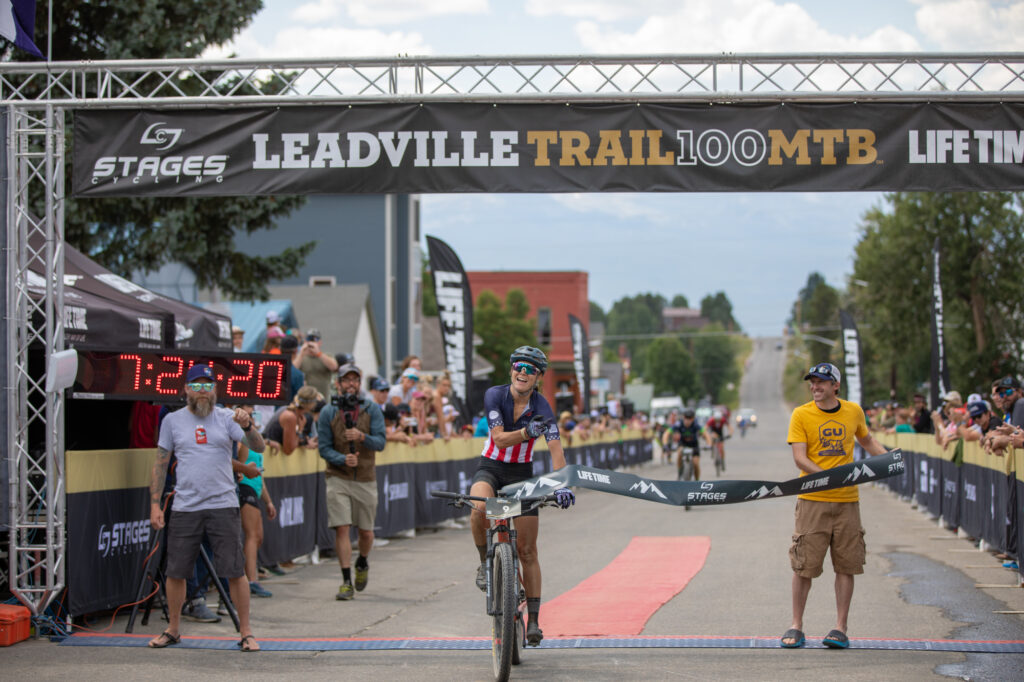Elite Riders to Watch Click the image below to check out the elite riders expected…
Q&A with 2x LT100 MTB winner, Rose Grant
Q&A with 2x Stages Cycling Leadville Trail 100 MTB Winner, Rose Grant
Put simply, two-time defending Stages Cycling Leadville Trail 100 MTB champion Rose Grant was born to race.
Born and raised (and now residing) in the powder-covered mountains of Northwest Montana, Rose developed her passion for mountain biking through a variety of outdoor endurance sports—from horsemanship and downhill skiing to running and collegiate soccer—uncovering a calling toward professional cycling along the way.
She just didn’t take the traditional route to get there.
Rose started cycling competitively in her late 20s, much later than most serious riders. She didn’t ride professionally until a couple years later, in 2012—the same year she got pregnant with her now-eight-year-old daughter, Layla. That didn’t stop her from quickly (and epically) pedaling into the cycling spotlight. In 2014, Rose won her first Mountain Bike Marathon National Championship…and she won her next four, too. Most recently, Rose added Leadville to her hardware collection, taking home the gold buckle at each of the last two Races Across the Sky (2019, 2021).
Following her last LT100 MTB victory—a 7:23:57 finish on August 14—we caught up with Rose to ask her a few questions about her path to professional cycling, her training techniques and how she became two-time defending champ.
Q: Tell us a little bit about your background. How did you end up as a pro cyclist?
Rose: I was raised in a small town in Darby, Montana—very rural and remote. As I got older, I started doing some running, and my older brother started working at a bike shop. He got into mountain biking, and I followed in his footsteps in high school. Being from Montana, mountain biking wasn’t much of a thing at the time, especially down in the south end of the Bitterroot Valley. I never got plugged in. I went to college in Florida and did a lot of different things for fun and for fitness, but I didn’t ever comprehend being anything beyond just a recreational athlete. I didn’t realize I had an opportunity or that—in mountain biking, specifically—a career even existed. Our community up in the Flathead Valley was more focused on the outdoors on a competitive level, so when my husband and I relocated to Montana in 2007, I was able to make some connections. I started racing mountain bikes at about 28 or 29 years old—just because I couldn’t run with my overuse injuries—and got involved with a local shop team here. It just opened up this whole new world. I felt like I finally found my calling. I realized I had the natural ability to handle a bike and an engine to go along with it, so I just nurtured that and started climbing the ladder from there. I won pretty much every race that I entered as an amateur, so I upgraded to pro in 2012 and also got pregnant with my daughter, Layla. Those first few years of my professional career, I really didn’t have a team or support, and I was also a new mom. I think ignorance is bliss in a situation where you’re camping and nursing and paying for everything. It’d be much different now, but back then, it’s what allowed me to get to where I am today.
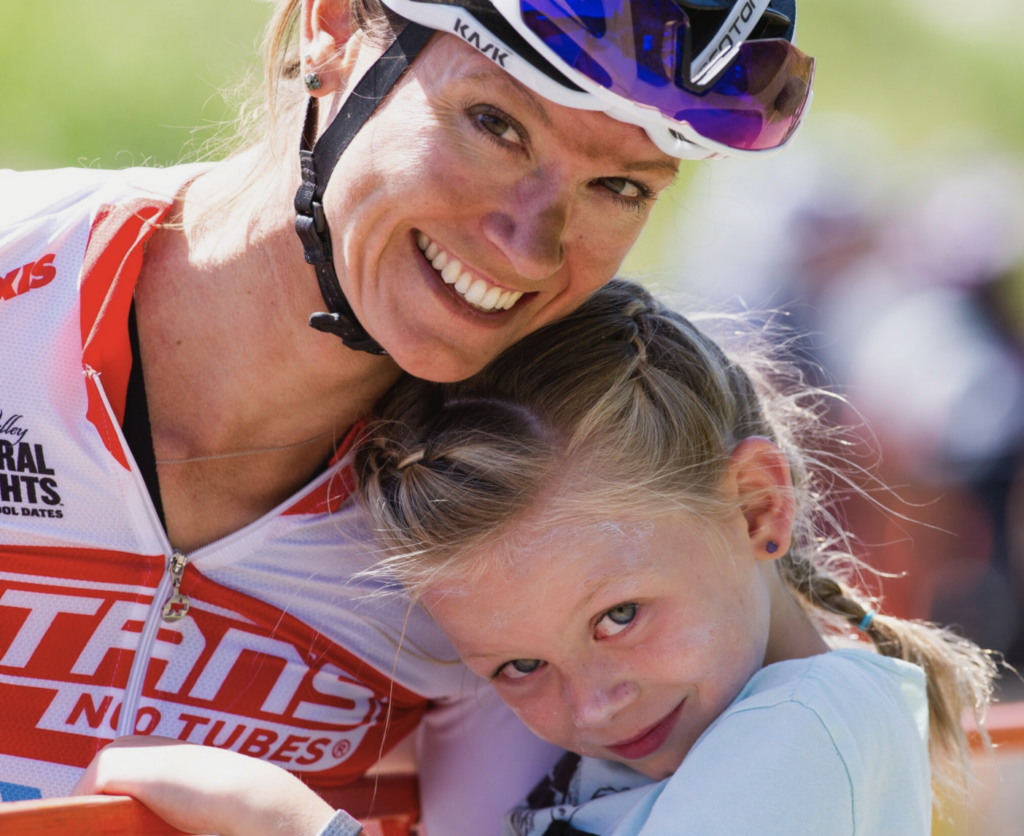
Q: I’d say that’s kind of a non-traditional approach, right?
Rose: Oh, completely. I really can’t credit anything except, that was my destiny. That was the path that God wanted me to be on. Amidst trials, I’ve always been blessed with these results that give me a platform and notoriety. There’s maybe been some luck, but some divine intervention, too, and confirmation of this is where I’m meant to be.
Q: When did you realize that the endurance side of things was going to be your cup of tea?
Rose: I always felt like I was better at the longer races, and for a long time, the “longer races” were the Epic Rides and Marathon Nationals. I didn’t do anything beyond a marathon, but I always liked those longer events better. They just suited my body better and the effort I was able to maintain. With age, too, it was like, “If I want to race World Cups, this is the time in my life that I need to focus on these races.” I didn’t start young—I was already in my 30s—and so I did focus on them. I raced five throughout my career—and the last one, I broke the top 20 at Mont-Sainte-Anne—but it’s just such a hard series to compete at as a mom. When I was able to surrender and accept that maybe that direction isn’t the direction that I’m supposed to go on, I could embrace where I’m strongest as an individual and shift gears to pursue that. It came with some encouragement, too, from some past sponsors that knew me well and watched me race a lot. Kenny said, “You’ve got to do Leadville. It’s my dream to watch you win Leadville.” That was 2019. That was my first 100-miler. I finished that race, looked at Kenny and said, “Well, I think you’re right. I think there might be more to this type of racing here for me.”
Q: First 100-miler. First Leadville. Show up. Win the race. No big deal.
Rose: I went into that race in 2019 just thinking, “I don’t really have any expectations. I don’t know who I’m racing against. We’re just gonna let this race play out,” which is kind of my motto with all racing. It just went really well. I felt good. I think it’s really important at Leadville to ride an individual effort, and I did that. On the way back, I didn’t have a lot of pressure. I just rode what felt good to me, and it was enough for a solid win.
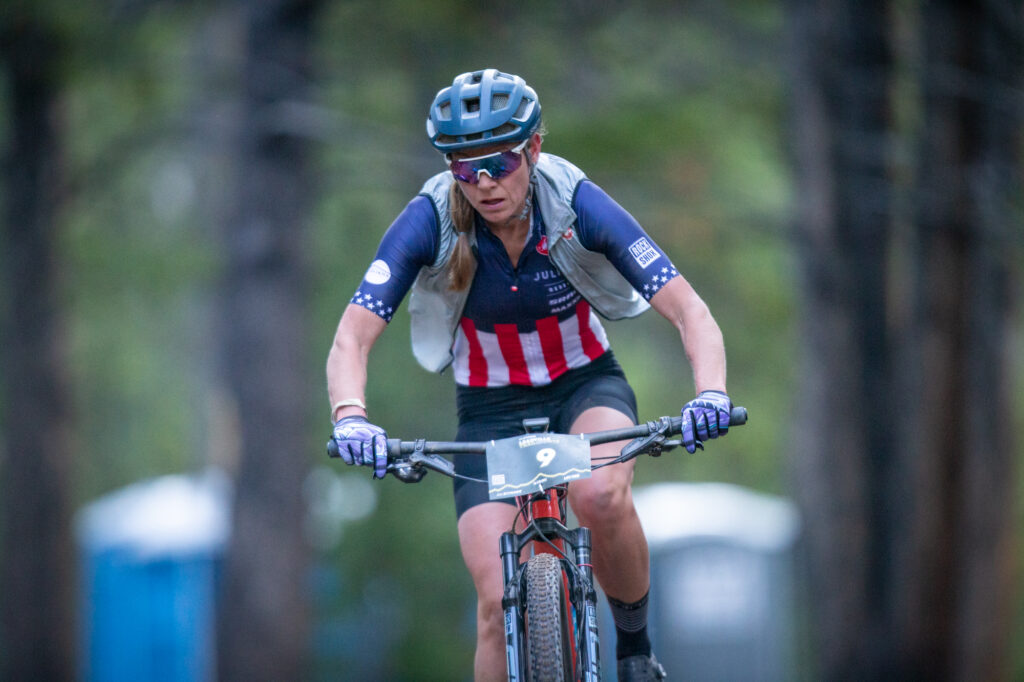
Q: You were obviously extremely prepared to take on the race. Did you go with the approach of, “I’m going to learn everything about the course and all these climbs and how to how to fuel and aid stations”? Or did you just show up and say, “I’m going to ride my race and give it a go”?
Rose: It was somewhere in the middle. I think a huge benefit for me that I’ve experienced, through these high altitude events, is to acclimate—at least two weeks at altitude—and I did that for 2019. I had raced earlier in Winter Park at the National Mountain Biking Championship. I went straight there on a Thursday and raced on Saturday and Sunday, and I just felt awful. That was two weeks before Leadville, so I stayed at altitude in preparation for Leadville. By the time Leadville rolled around, I felt like a completely different person. Being up there, too, I was able to pre-ride the course over the course of two days. At that point, I can visualize everything. My coach, Jason Tullous, typically has a lot of athletes racing Leadville—and he has raced it himself—and is very knowledgeable about pacing and feeling. Taking his recommended battle plan, I ingested that and memorized it.
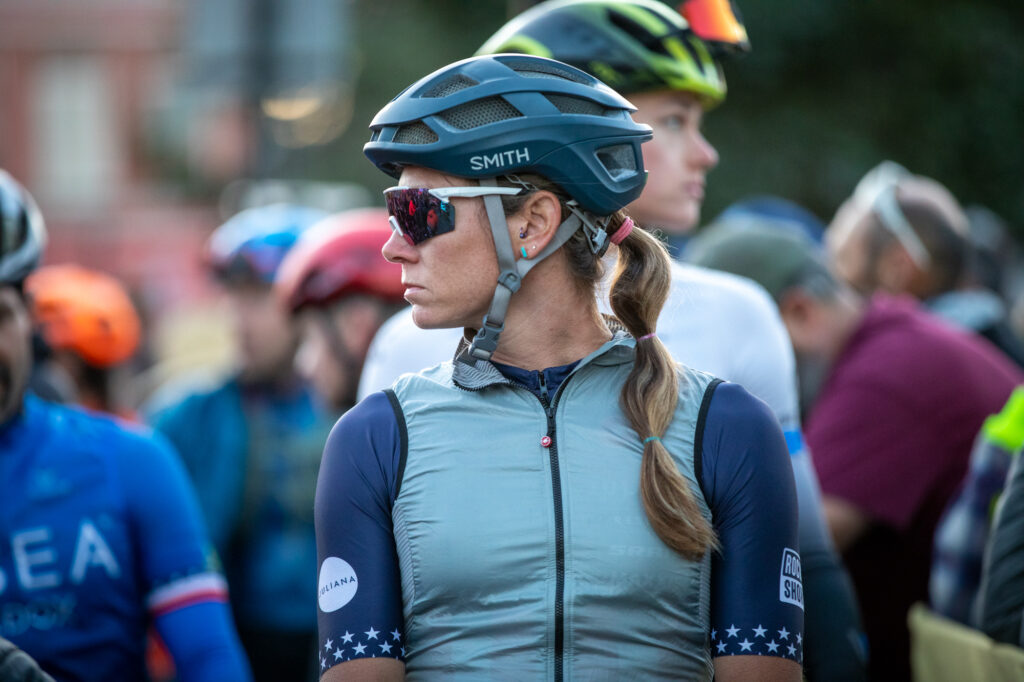
Q: Fast forward to 2021. You came back, and you won again. What sort of lessons did you learn from 2019 that helped you through this year’s race?
Rose: This year was a bit different from 2019. As the defending champion, I felt like I had something to live up to or perform to. I try not to put that pressure on myself, but Leadville was important to me. Also, the depth of field just kept growing. These strong women continued to sign up. I know how strong they are, so I just continued telling myself, “Stick to your plan. This is largely an individual race. Don’t you worry about how far ahead anyone is or what they’re doing. You know how to pace yourself, and you do it.”
In 2019, I was riding, and I had a gentleman that I rode with pretty much the whole way out through Columbine and back on the Powerline. At one point, we were chatting—I was riding in fourth or fifth place at the time—and he asked if I’d raced Leadville before. I told him I was defending from 2019, and he was like, “Let’s get you up to those other women!” This was before the Columbine climb. I was like, “No, just steady. I’m not putting out any big efforts at all. I just have to go steady. The race doesn’t really start until Powerline on the way back.” When we got to the finish line, he came up to me and said, “Man, I cannot believe how you did exactly what you said you were going to do. You guys hit Powerline, I was gone, and you won!” It was confirmation of really just being able to execute a race plan and stay within what you know your body can do.
Q: I looked up your split times, and you were 2:05 inbound from Pipeline, which is incredible. Was that the strategy for the day, just to wait till the second half? Or did you just feel good in the second half?
Rose: I tend to feel better later in the race. I have a real natural ability to pace myself because I can’t go any harder. I know if I go any harder, I’m gonna blow up. I wasn’t up front with Katerina [Nash], but I remember my coach talking to me about how, one of the years, somebody was 13 minutes ahead going into Powerline, and he ended up fourth or sixth or something. So, it was really about not letting that get in my head. I knew I had some ground to make up, but then I slowly started closing those gaps going up Columbine. I settled into my own pace. By the time I got to the top, the top-five women were all really quite close to each other. It didn’t start shaking out until the way back. I wouldn’t say I started feeling great, but I was in a rhythm. I was in my rhythm.
Q: The three of you—Moriah [Wilson], yourself and Sarah [Sturm]—all came into the base of Powerline together, so that was really exciting for us to watch. When we got word that the three of you were together, we were like, “Wow, we’ve got a bike race on our hands.” How did the next few miles and Powerline and the rest of the race play out for you guys?
Rose: We entered together at the beginning section where it’s just a daunting climb. You’re just grinding to get to the top. Sarah and Moriah were right next to each other ahead of me, and I let just a small gap open—max 10 seconds—to conserve a tiny bit. They were racing each other a little bit. I was watching but also really focused on staying within myself. When we crested the top of that climb, they were recovering, descending super lightly, and I had just enough to maintain power over the top and down the descent. I never looked back.
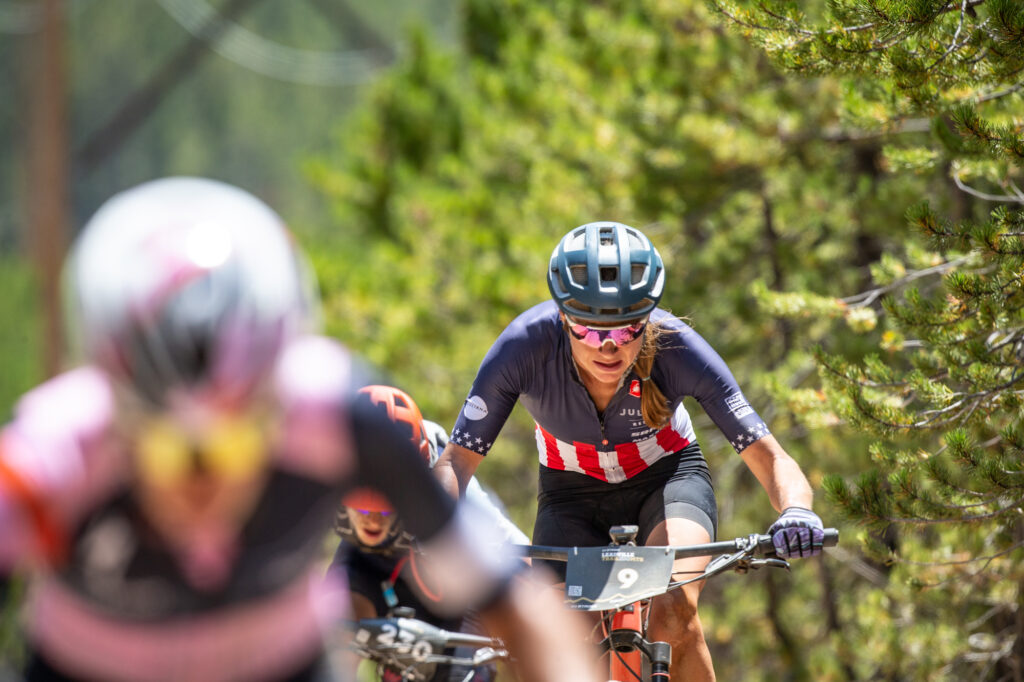
Q: Yeah, you had the gap, and you were on your way home.
Rose: Yeah, but I never knew how big it was! I felt like Moriah was probably right behind me. Then, up the finishing stretch, I found a good wheel on the straightaway up to the finish. I looked back and saw a kit that was a similar color to Moriah’s tucked in the arrow position, just coming for me. I was like, “Oh, man. I gotta go! I’m getting chased!” I burned every single match I had left just to find out that it wasn’t even Moriah! It was one of the guys! But you never know. It’s not over till it’s over.
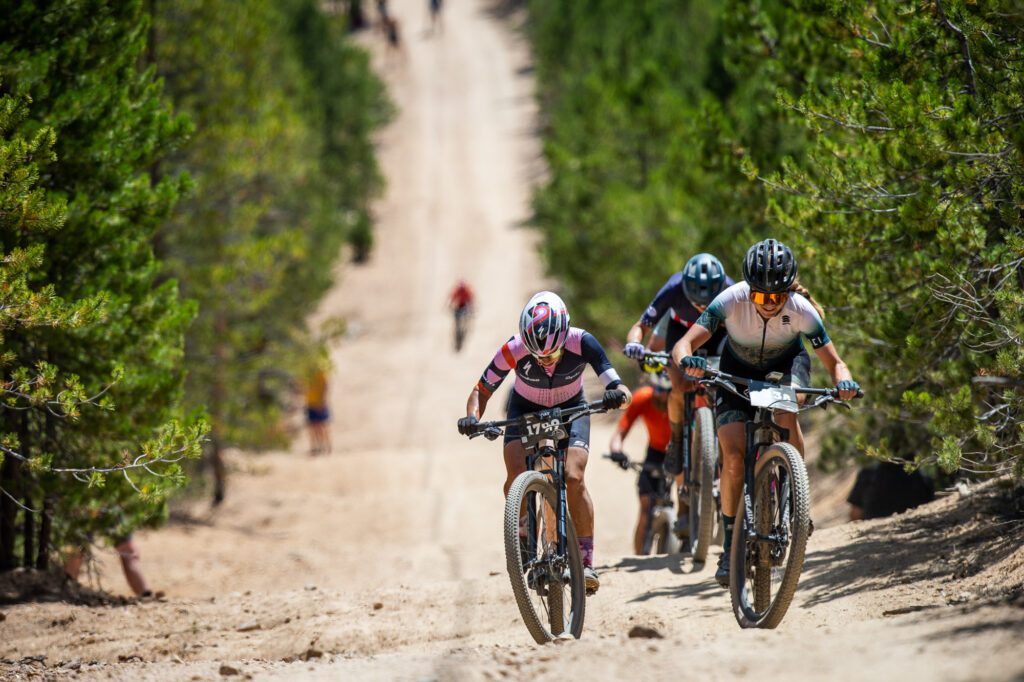
Q: Looking at the results from 2019 and 2021, I’d say, undeniably, there was a deeper field this year. Was it more rewarding looking at that results list and saying, “Holy cow. I beat this incredibly high quality field”? Or was it more of a personal battle?
Rose: I would say it was a little of both. I was prepared. I had to get myself some positive self-talk prior to the race knowing like, “Hey, your value isn’t in a result. If you execute your race plan, and you do it well, you can produce a better time than two years ago.” I wanted to do sub-7:30 in two years. I was 7:36:06 in 2019. “If I produce a sub-7:30 race, that’s a solid race and an improvement from two years ago. It doesn’t matter what your number is.” I knew other women were there highly intending to win. You have to be happy with that, too. You have to celebrate that. To win, it was hard fought—and it was harder than 2019 because of the depth of field—but it was really exciting. It was dynamic racing with these super strong girls. I really had to earn it! To race a little scared like that—like, “Ah! I’m getting chased!”—was pretty fun. It was really cool to see that depth of field show up this year, and I hope it continues to get deeper.
Q: Awesome, Rose. This has been really great catching up with you about the Leadville 100. We’re just so excited to have had you here. Thanks for your time and for explaining all about your experience with the race. I got to ask: are we going to see you in 2022?
Rose: We’re planning on it.
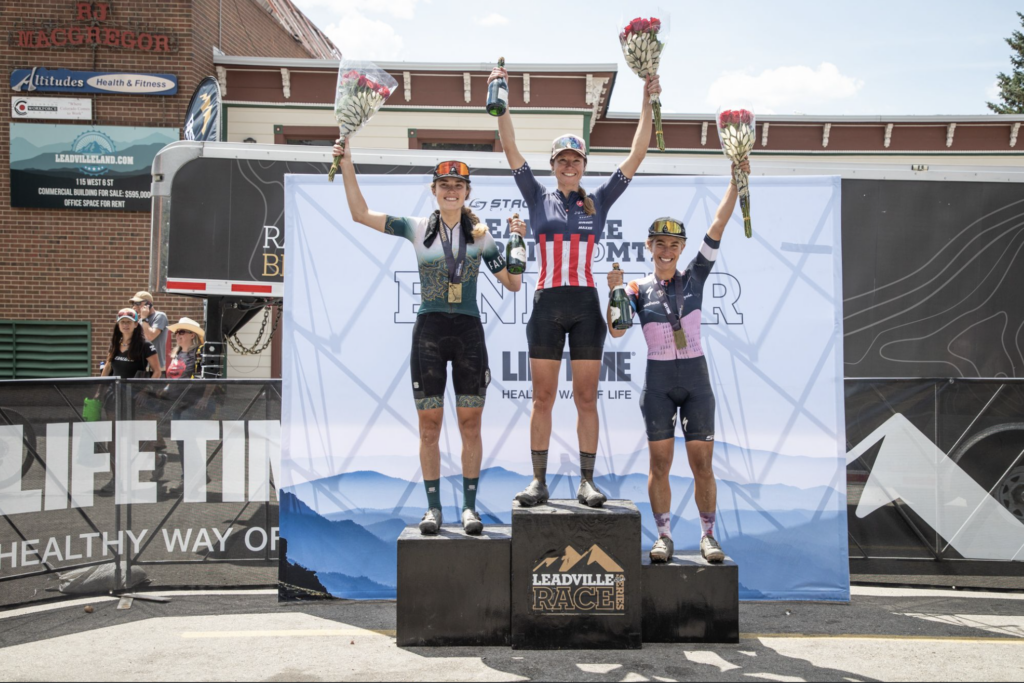
We’d like to extend a big thanks to Rose for taking the time to bring us through her story to becoming two-time LT100 MTB champ. You can watch our FULL conversation with Rose here and follow her on Instagram (@rosekgrant) or her website as she continues her path to defending her Leadville title in 2022.

